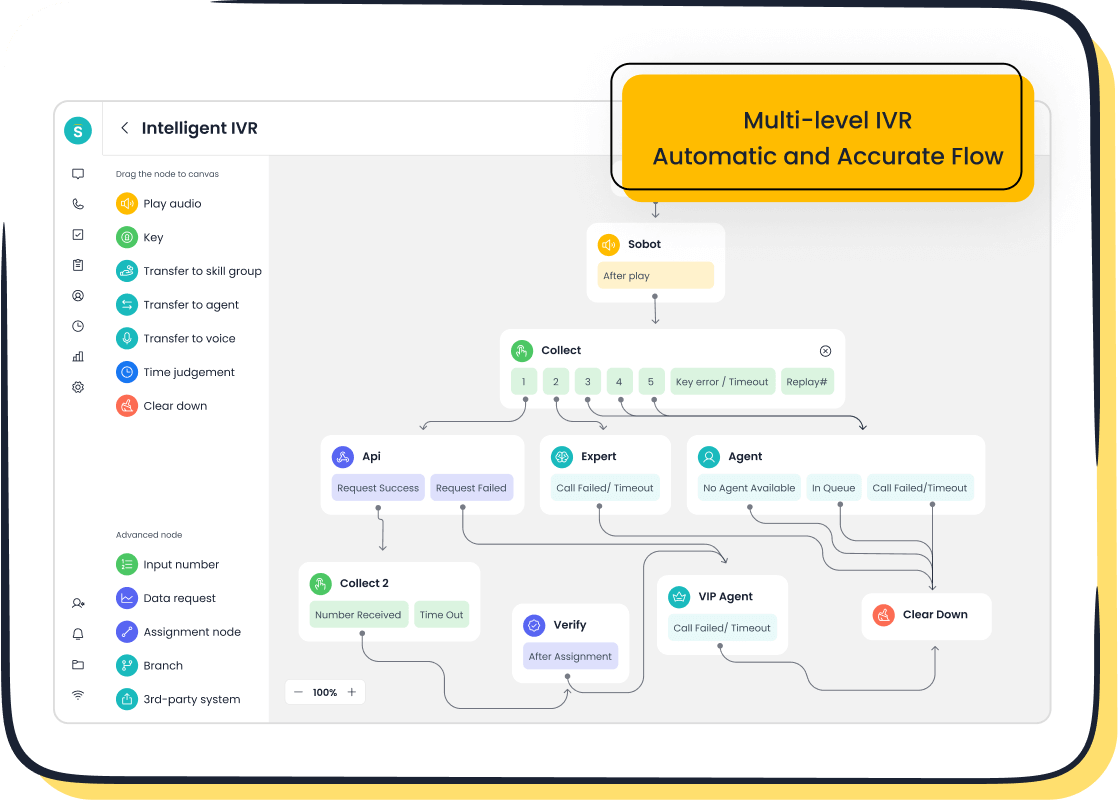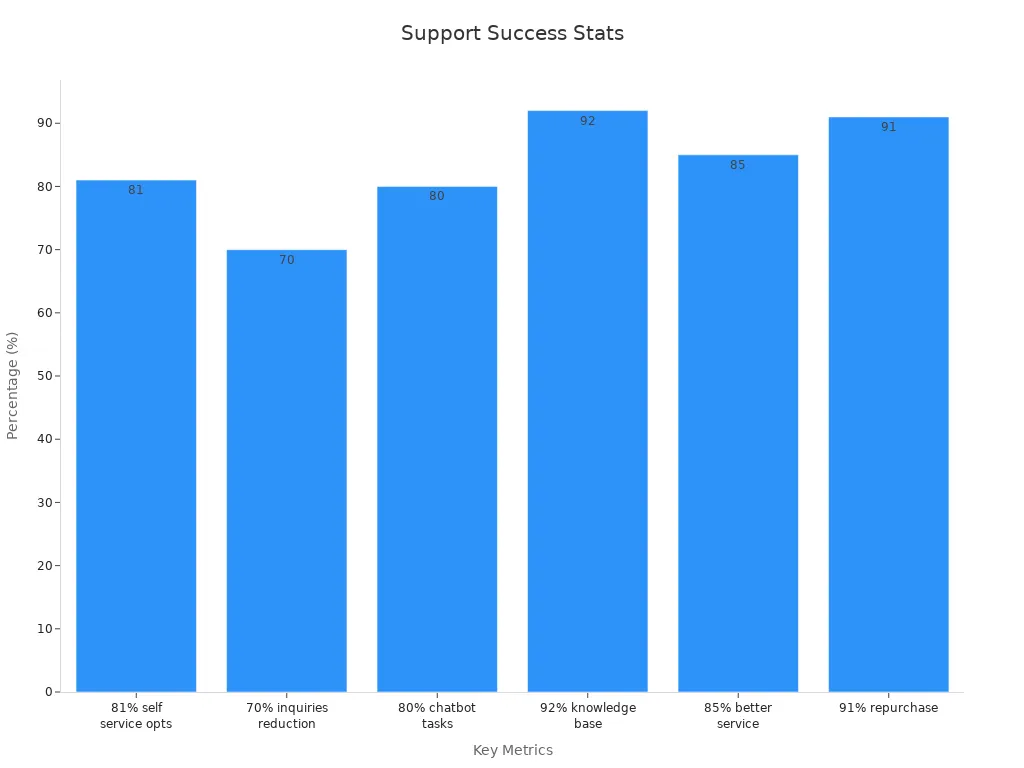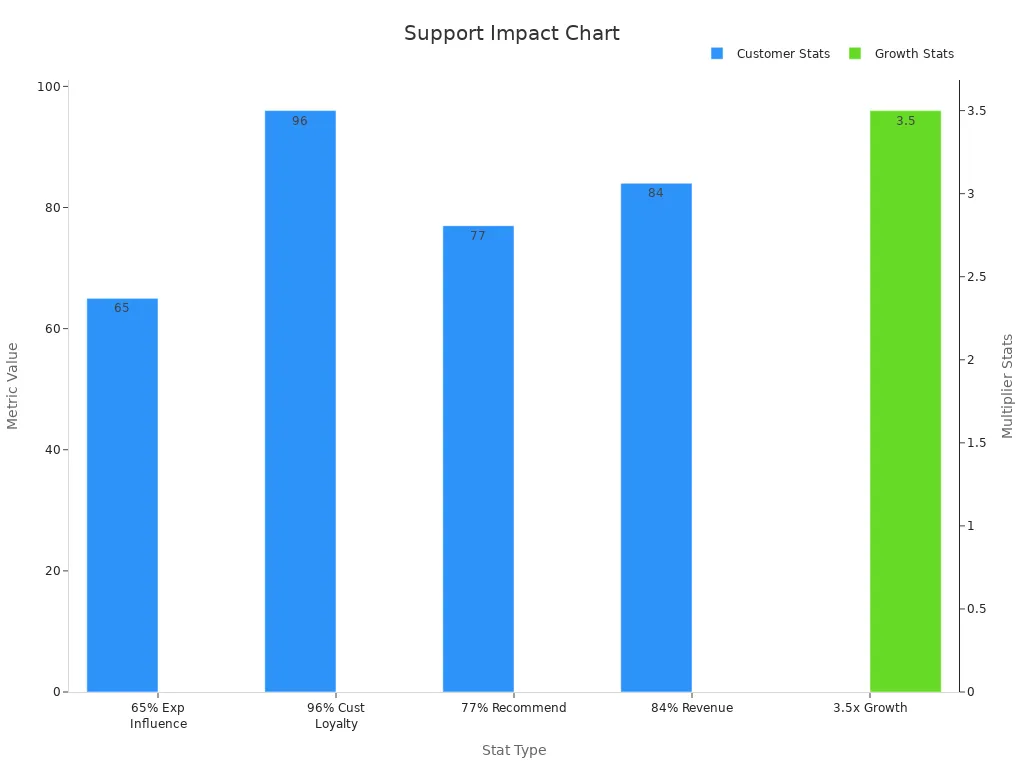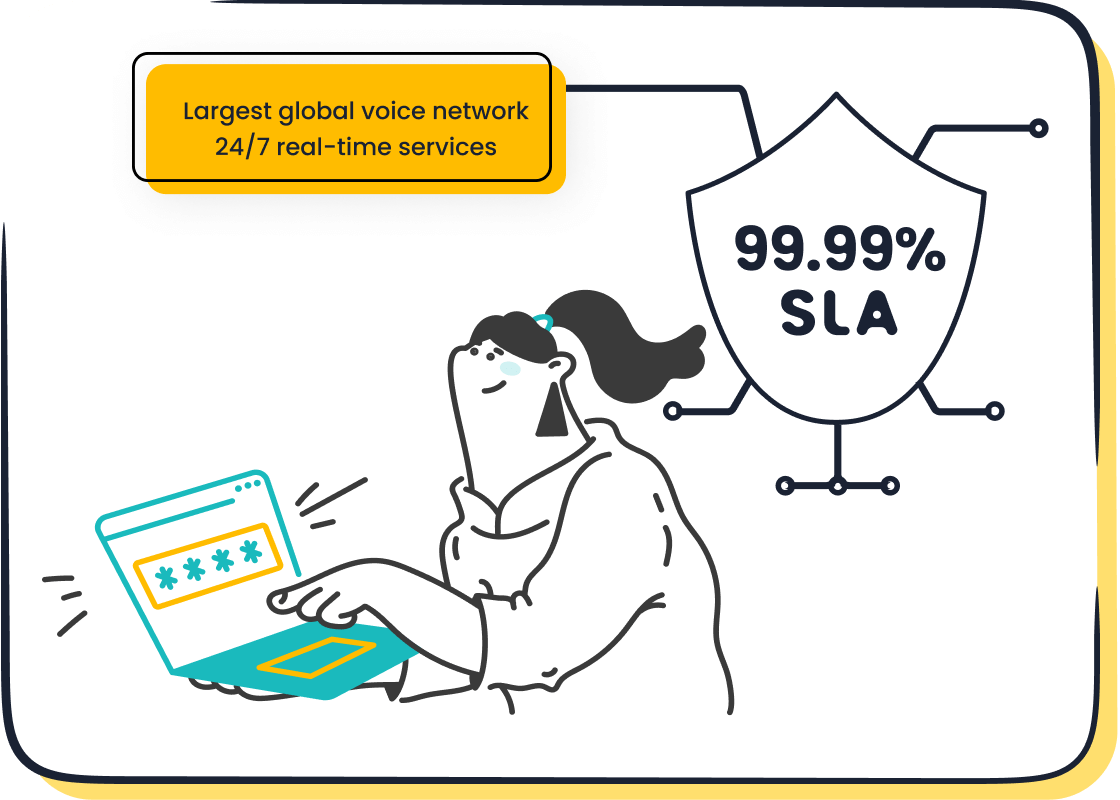Manager of Customer Support: A Job That Matters

A manager of customer support plays a vital role in creating exceptional experiences for your customers. You lead the charge in ensuring smooth support operations, resolving issues effectively, and maintaining satisfaction levels. This role directly impacts customer loyalty and drives business growth.
Why does this matter? Statistics show that 80% of organizations aim to compete on customer experience, and customer-centric brands achieve profits 60% higher than others. With tools like Sobot’s solutions, you gain the resources to enhance satisfaction and streamline operations, ensuring your customers feel valued at every interaction.
What Does a Manager of Customer Support Do?
Defining the Role and Responsibilities
A customer service manager oversees the daily operations of the support team. You ensure that every customer interaction meets high standards of quality and efficiency. Your role involves setting clear goals, monitoring performance, and implementing strategies to improve service delivery. For example, you might focus on reducing average ticket handling time or increasing first contact resolution rates. These metrics reflect how well your team resolves issues and satisfies customers.

Your responsibilities also include training and mentoring your team. By equipping agents with the right tools and knowledge, you empower them to handle complex cases confidently. Tools like Sobot's Voice/Call Center can streamline workflows, allowing your team to focus on delivering exceptional service. As a leader, you act as the bridge between your team and the organization, ensuring alignment with company goals and customer expectations.
Positioning Within the Organization
As a customer service manager, you hold a pivotal position within the company. You collaborate with various departments, such as sales, marketing, and product development, to ensure a seamless customer experience. Your insights into customer feedback help shape business strategies and improve products or services. For instance, if customers frequently report issues with a product feature, you can relay this information to the development team for improvement.
Your role also involves reporting key performance metrics to senior management. Metrics like customer satisfaction (CSAT) and overall resolution rates demonstrate the effectiveness of your team and highlight areas for improvement. A well-performing support team not only enhances customer relationships but also contributes to the company's reputation and growth.
Interaction with Customers and Internal Teams
Effective communication lies at the heart of your role. You interact with customers to resolve escalated issues and gather valuable feedback. This direct engagement helps you understand customer needs and expectations, enabling you to tailor your support strategies accordingly. For example, 91% of customers are more likely to repurchase after a great service experience, emphasizing the importance of your role in fostering loyalty.
Internally, you work closely with your team to ensure smooth operations. You also coordinate with other departments to address customer concerns that require cross-functional collaboration. The effectiveness of these interactions can be measured using metrics like engagement and interaction rates. Here's a quick overview:
| Metric | Description |
|---|---|
| Reach | Measures how many employees have access to communication channels and how often they engage with them. |
| Engagement | Assesses the level of interaction employees have with the content shared through communication channels. |
| Interaction Rates | Indicates how many employees actively engage with content rather than just reading it passively. |
| Employee Response | Evaluates the types of responses generated by the content, reflecting the effectiveness of communication. |
By fostering strong communication within your team and across the organization, you ensure that everyone works towards a common goal: delivering exceptional customer service.
Key Responsibilities of a Customer Service Manager

Leading and Motivating Support Teams
As a customer service manager, your ability to lead and inspire your support team directly impacts their performance and the overall service quality. Transformational leadership plays a crucial role in fostering intrinsic motivation among customer service agents. This leadership style not only enhances job satisfaction but also reduces burnout and social loafing. The table below highlights the connection between leadership, motivation, and performance:
| Evidence Description | Key Findings |
|---|---|
| Transformational leadership fosters intrinsic motivation | This leadership style enhances work performance and reduces burnout and social loafing. |
| Intrinsic motivation is linked to job performance | Employees with high intrinsic motivation tend to perform better and contribute to organizational growth. |
| Transformational leadership influences intrinsic motivation | Leaders provide a collective vision that increases employees' motivation and job satisfaction. |

By creating a positive work environment and setting clear goals, you empower your team to handle customer inquiries effectively. Tools like Sobot's Voice/Call Center can further streamline workflows, allowing agents to focus on delivering exceptional service.
Developing and Executing Support Strategies
A support manager must develop strategies that align with customer needs and organizational goals. Implementing self-service options, such as AI-driven chatbots, can significantly reduce the workload on your customer service team. For instance, 81% of customers prefer self-service options, and businesses have documented up to a 70% reduction in inquiries after deploying virtual customer assistants. The chart below illustrates the success of various support strategies:

By leveraging tools like Sobot's Omnichannel Solution, you can integrate multiple communication channels into a unified workspace. This approach ensures that customer inquiries are resolved efficiently, enhancing customer satisfaction and loyalty.
Monitoring Customer Satisfaction Metrics
Tracking customer satisfaction metrics is essential for improving service quality. Metrics such as customer experience improvement, satisfaction levels, and loyalty provide valuable insights into your team's performance. For example:
- Customer experience improvement can increase revenue by 2-7%.
- High satisfaction levels are directly linked to a 1-2% increase in profitability.
- 61% of customers are willing to pay 5% more for better service.
By analyzing these metrics, you can identify areas for improvement and implement targeted strategies. Sobot's real-time monitoring and analytics tools enable you to track these metrics effectively, ensuring that your team consistently delivers high-quality service.
Managing Escalated Issues and Complex Cases
Handling escalated issues and complex cases is one of the most critical responsibilities of a customer service manager. These situations often involve dissatisfied customers or intricate problems that require advanced problem-solving skills. Your ability to address these challenges effectively can significantly impact customer satisfaction and loyalty.
When managing escalated issues, you need to act swiftly and decisively. Start by gathering all relevant information from your customer service agents and reviewing the customer’s history. This ensures you fully understand the problem before proposing a solution. For example, if a customer reports repeated billing errors, you can use tools like Sobot's Voice/Call Center to access call recordings and transaction details. This approach not only resolves the issue but also prevents similar problems in the future.
Complex cases often require collaboration with other departments. For instance, a technical issue might need input from the engineering team, while a billing dispute could involve the finance department. By coordinating these efforts, you ensure the customer receives a seamless resolution. Additionally, providing regular updates to the customer during the process builds trust and demonstrates your commitment to their satisfaction.
Collaborating Across Departments for Seamless Customer Experience
Cross-department collaboration is essential for delivering a seamless customer experience. As a customer service manager, you act as the bridge between your team and other departments, ensuring everyone works towards a common goal. This collaboration not only resolves customer-related issues efficiently but also enhances overall operational productivity.
Studies show that companies with cross-functional collaboration can boost productivity by up to 25%. For example, a leading technology firm integrated teams from engineering, marketing, and customer service. This approach reduced project completion times by 30% and improved customer satisfaction. You can achieve similar results by fostering open communication and aligning objectives across departments.
Using tools like Sobot's Omnichannel Solution simplifies this process. It consolidates customer inquiries from various channels into a unified workspace, enabling your team to share information effortlessly. This integration ensures that all departments have access to the same data, reducing miscommunication and delays. By working together, you create a cohesive support system that meets customer expectations and strengthens loyalty.
Essential Skills and Qualities for a Support Manager
Communication and Interpersonal Expertise
As a support manager, your ability to communicate effectively shapes the success of your customer service team. Clear communication ensures that your team understands their goals and responsibilities. Strong interpersonal skills help you build trust and motivate your agents to perform at their best. These skills also play a key role in fostering alignment within your team and improving customer service outcomes.
- Interpersonal skills motivate teams to stay engaged and productive.
- Active listening and clear instructions create a sense of direction.
- Effective communication leads to better customer interactions.
For example, when handling customer inquiries, your ability to listen attentively and respond clearly can turn a frustrated customer into a loyal one. Tools like Sobot’s Omnichannel Solution can further enhance communication by unifying customer data, enabling you to provide personalized support across multiple channels.
Leadership and Team Management Skills
Your leadership directly impacts the performance of your customer service team. A great support manager inspires their team to excel by setting clear expectations and providing consistent feedback. Transformational leadership, which focuses on motivating employees through a shared vision, has been shown to improve job satisfaction and reduce burnout.
Consider implementing customer service training programs to equip your agents with the skills they need to handle complex situations. For instance, using Sobot’s Voice/Call Center, you can monitor calls in real-time and provide immediate coaching to your team. This approach not only improves individual performance but also strengthens the overall efficiency of your support operations.
Problem-Solving and Analytical Thinking
Problem-solving skills are essential for addressing challenges that arise in customer support. As a support manager, you need to analyze issues quickly and develop effective solutions. For example, if your team struggles with long resolution times, you can use analytics tools to identify bottlenecks and implement process improvements.
Sobot’s real-time monitoring features allow you to track key metrics like average handle time and first-contact resolution rates. These insights help you make data-driven decisions that enhance your team’s performance. By fostering a culture of analytical thinking, you empower your team to tackle challenges proactively, ensuring a seamless experience for your customers.
Empathy and Customer-Centric Approach
Empathy is one of the most critical skills for a support manager. It allows you to understand your customers' emotions and needs, creating a connection that fosters trust and loyalty. When customers feel heard and valued, they are more likely to remain loyal to your brand. For instance, studies show that 70% of customers are willing to spend more with companies that provide excellent customer service.
To develop empathy, you need to actively listen to your customers. Pay attention to their concerns and acknowledge their feelings. For example, if a customer expresses frustration about a delayed order, respond with understanding and offer a solution. This approach not only resolves the issue but also leaves a positive impression.
A customer-centric mindset goes hand in hand with empathy. By putting your customers at the center of your strategies, you ensure that every decision aligns with their expectations. Tools like Sobot’s Omnichannel Solution can help you achieve this by consolidating customer data into a unified workspace. This allows you to personalize interactions and address issues more effectively.
Tip: Encourage your team to practice empathy during customer interactions. Role-playing exercises during training sessions can help agents develop this essential skill.
Proficiency in Tools Like Sobot's Voice/Call Center
As a support manager, your ability to use advanced tools can significantly enhance your team's performance. Proficiency in tools like Sobot's Voice/Call Center enables you to streamline workflows, monitor key metrics, and improve customer satisfaction. These tools provide features such as intelligent IVR, real-time monitoring, and AI-powered voicebots, which simplify complex processes and boost efficiency.
Strong problem-solving skills are essential when managing customer support operations. Analytical thinkers excel at identifying inefficiencies and implementing solutions. For example:
- They quickly identify problems and determine effective solutions.
- They evaluate data to foresee risks and make better decisions.
- They streamline processes, boosting productivity and reducing errors.
Sobot’s Voice/Call Center supports these efforts by offering real-time analytics and call tracking. These features allow you to analyze customer interactions, identify trends, and make data-driven decisions. For instance, if your team struggles with long call durations, you can use the platform’s analytics to pinpoint the issue and implement targeted improvements.
By mastering these tools, you not only enhance your team’s efficiency but also ensure a seamless experience for your customers.
Why the Role of a Customer Support Manager is Crucial
Enhancing Customer Satisfaction and Loyalty
As a manager of customer support, your role directly influences customer satisfaction and loyalty. Customers value speed, convenience, and knowledgeable assistance. Nearly 80% of American consumers identify these as the most critical elements of a positive customer experience. When you ensure your team meets these expectations, you create a foundation for long-term loyalty.
Satisfied customers are more likely to return and spend more. When customers feel appreciated, they reward businesses with increased spending and loyalty. For example, using tools like Sobot's Omnichannel Solution allows you to streamline communication across channels, ensuring faster and more personalized responses. This approach not only resolves issues efficiently but also leaves a lasting positive impression.
| Key Point | Evidence |
|---|---|
| Importance of Speed | Nearly 80% of American consumers say speed, convenience, and friendly service matter most. |
| Customer Loyalty | When customers feel appreciated, companies gain measurable benefits. |
| Business Benefits | Meeting or exceeding expectations leads to increased customer spending. |
By focusing on these elements, you can elevate the customer experience and foster loyalty that drives repeat business.
Strengthening Brand Reputation
Your efforts as a customer support manager play a vital role in shaping your company's reputation. A positive customer experience often outweighs traditional advertising. In fact, 65% of consumers find a great experience more influential than ads. When you deliver exceptional support, you create advocates for your brand.
Statistics show that 96% of customers consider customer service crucial for brand loyalty. Additionally, 77% of customers recommend a brand after a positive experience. These numbers highlight the importance of your role in building trust and credibility. Companies that treat customer service as a value center grow 3.5 times faster than those that don’t.

Using tools like Sobot's Voice/Call Center, you can monitor customer interactions in real-time and ensure consistent quality. This proactive approach strengthens your brand's reputation and builds lasting relationships with customers.
| Statistic | Source |
|---|---|
| 65% of consumers find a positive experience more influential than advertising. | edume |
| 96% of customers say customer service is crucial for brand loyalty. | wisernotify |
| 77% of customers would recommend a brand after a positive experience. | wisernotify |
| Companies treating customer service as a value center see 3.5x faster growth. | emplifi |
| 84% of companies improving customer experience report increased revenue. | edume |
Driving Business Growth and Retention
Your role as a customer support manager directly impacts business growth and retention. Resolving issues at the first engagement can prevent 67% of customer churn. This highlights the importance of equipping your team with the right tools and strategies to address concerns promptly.
Customer-centric companies are 60% more profitable. By focusing on customer needs, you not only retain existing customers but also attract new ones. Increasing customer retention rates by just 5% can boost profits by 25-95%. These figures demonstrate the significant financial benefits of effective customer support management.
- 67% of customer churn could be avoided if issues were resolved at the first engagement.
- Customer-centric companies are 60% more profitable.
- Increasing customer retention rates by 5% increases profits by 25-95%.
Sobot's solutions, such as the Voice/Call Center, empower you to manage calls efficiently and track key metrics like first-contact resolution rates. By leveraging these tools, you can enhance operational efficiency and drive sustainable growth for your organization.
Bridging the Gap Between Customers and the Organization
As a customer support manager, you serve as the vital link between your customers and your organization. Your role ensures that customer feedback reaches the right teams, enabling your company to adapt and improve. This connection fosters trust and loyalty, as customers feel their voices are heard and valued.
One way to bridge this gap is by actively collecting and analyzing customer feedback. For example, if customers frequently mention delays in response times, you can use tools like Sobot's Omnichannel Solution to identify bottlenecks and streamline communication. This unified platform consolidates customer interactions across channels, giving you a complete view of their concerns. By addressing these issues promptly, you demonstrate your commitment to improving the customer experience.
Collaboration with internal teams also plays a crucial role. Sharing customer insights with departments like product development or marketing ensures that your organization aligns its strategies with customer needs. For instance, if customers express dissatisfaction with a product feature, you can relay this information to the development team for refinement. This proactive approach not only resolves immediate concerns but also strengthens your brand's reputation.
Tip: Regularly schedule cross-departmental meetings to discuss customer feedback. This practice ensures that everyone in your organization stays aligned with customer expectations.
By acting as the bridge between customers and your organization, you create a seamless flow of communication that benefits both parties. Customers feel valued, and your company gains actionable insights to drive growth and innovation.
Ensuring Operational Efficiency with Tools Like Sobot's Solutions
Operational efficiency is the backbone of effective customer support. When your team operates smoothly, customers receive faster and more accurate assistance. Specialized customer support solutions, like Sobot's Voice/Call Center, play a pivotal role in achieving this efficiency.
These tools offer features that optimize workflows and reduce inefficiencies. For example:
- Analyzing call data helps you optimize staffing and payroll, leading to cost savings.
- Efficient call routing minimizes transfer rates, keeping agents focused on resolving customer issues.
- Data-driven decisions streamline workflows, reducing call handling times and improving overall efficiency.

Sobot's Voice/Call Center provides real-time monitoring and analytics, enabling you to track key metrics like average handle time and first-contact resolution rates. These insights empower you to make informed decisions that enhance your team's performance. For instance, if you notice a spike in call durations, you can investigate the root cause and implement targeted solutions.
Additionally, tools like Sobot's Omnichannel Solution integrate multiple communication channels into a single platform. This integration eliminates the need for agents to switch between systems, saving time and reducing errors. It also provides a unified workspace where agents can access customer data instantly, ensuring personalized and efficient service.
Example: Clinical documentation improvement software in healthcare settings has shown how streamlined operations optimize resource utilization. Similarly, customer support tools enhance efficiency by ensuring accurate documentation and reducing repetitive tasks.
By leveraging these advanced tools, you not only improve operational efficiency but also elevate the customer experience. Customers benefit from quicker resolutions, and your team enjoys a more organized and productive workflow.
How Sobot Empowers Customer Support Managers

Leveraging Sobot's Voice/Call Center for Efficient Call Management
Sobot's Voice/Call Center simplifies call management for your team. It offers features like intelligent IVR and smart call routing, ensuring customers connect with the right agents quickly. This reduces wait times and improves customer satisfaction. You can monitor calls in real-time, track key metrics, and analyze data to identify areas for improvement.

For example, if your team struggles with long call durations, Sobot's analytics tools help pinpoint the issue. You can then adjust workflows or provide targeted training to agents. The platform also supports global telephony contacts, enabling you to assist customers across different regions seamlessly. With a 99.99% system uptime, you can rely on Sobot's Voice/Call Center to maintain smooth operations and deliver exceptional customer experiences.
Tip: Use Sobot's AI-powered Voicebot to handle repetitive queries, freeing your agents to focus on complex cases.
Enhancing Multichannel Support with Sobot's Omnichannel Solution
Sobot's Omnichannel Solution integrates all communication channels into a unified workspace. This allows your team to manage customer inquiries from email, social media, and voice calls without switching systems. By consolidating customer data, the platform ensures personalized and efficient support.
The solution boosts agent efficiency by 30% and achieves a customer satisfaction score of 97%. These results highlight its effectiveness in enhancing multichannel support. For instance, if a customer contacts your team via social media and later follows up through email, Sobot's unified workspace provides a complete interaction history. This eliminates repetitive questioning and speeds up resolution times.
| Metric | Result |
|---|---|
| Increase in agent efficiency | 30% |
| Customer satisfaction score | 97% |
Note: Multichannel support ensures customers can reach you through their preferred platforms, improving their overall experience.
Real-Time Monitoring and Analytics for Better Decision-Making
Sobot equips you with real-time monitoring and analytics tools to make informed decisions. You can track metrics like average handle time and first-contact resolution rates, helping you identify trends and optimize workflows. These insights allow you to address inefficiencies and improve your team's performance.
For example, if you notice a spike in unresolved cases, Sobot's analytics can reveal the root cause. You might discover that certain inquiries require additional training or resources. By acting on this data, you enhance operational efficiency and ensure customers receive timely support.
Sobot's tools also provide proactive insights, enabling you to forecast workload demands and adjust team configurations. This ensures your team remains prepared to handle peak periods without compromising service quality.
Example: Businesses using Sobot's analytics have reported faster resolution times and improved customer satisfaction.
Case Study: How Samsung Improved Customer Satisfaction with Sobot
Samsung, a global leader in technology, faced challenges in managing a high volume of customer inquiries across multiple channels. The company needed a solution to unify its communication systems and improve the efficiency of its support operations. By partnering with Sobot, Samsung transformed its customer service approach and achieved remarkable results.
Sobot's all-in-one contact center solution provided Samsung with a unified platform to manage customer interactions. This integration allowed Samsung's support team to handle inquiries from various channels, such as email, social media, and phone calls, without switching systems. The platform also connected seamlessly with Samsung's internal tools, ensuring agents had access to complete customer histories. This eliminated repetitive questioning and improved the overall experience.
One of the standout features was Sobot's AI-powered chatbot, which handled repetitive queries. This freed up Samsung's support agents to focus on complex cases. Additionally, VIP customers received personalized video support, enhancing their satisfaction. These innovations led to a 30% increase in agent efficiency and a customer satisfaction rate of 97%.
Samsung's collaboration with Sobot also enabled real-time monitoring and analytics. Managers could track key metrics like resolution times and identify areas for improvement. For example, when Samsung noticed delays in resolving technical issues, the data helped them implement targeted training for their support team. This proactive approach ensured faster resolutions and happier customers.
The results speak for themselves. Samsung not only improved its operational efficiency but also strengthened its reputation for excellent customer service. By leveraging Sobot's solutions, Samsung demonstrated how technology can elevate the customer experience and drive loyalty.
Tip: Consider using Sobot's tools to unify your support channels and enhance customer satisfaction, just like Samsung did.

A customer support manager plays a pivotal role in ensuring customer satisfaction and driving organizational success. Your leadership shapes the quality of service, builds loyalty, and strengthens your company's reputation. By focusing on efficient operations and empowering your team through proper training, you create a foundation for long-term growth.
Tools like Sobot's Voice/Call Center amplify your impact. They streamline workflows, enhance response times, and provide real-time analytics to optimize performance. For example, automation features improve operational efficiency, while intelligent routing ensures customers connect with the right agents. These tools help you achieve key metrics that reflect your team's success:
| Metric | Description |
|---|---|
| First Call Resolution (FCR) | Measures the percentage of customer issues resolved on the first contact, indicating efficiency. |
| Customer Satisfaction Score (CSAT) | Reflects customer satisfaction levels, crucial for assessing support effectiveness. |
| AI-driven Automation Impact | Highlights the role of automation in improving response times and operational efficiency. |
By leveraging these solutions, you not only enhance customer experiences but also position your organization for sustained success.
FAQ
What is the role of a customer support manager?
You lead the team responsible for resolving customer inquiries and ensuring satisfaction. Your role involves managing operations, monitoring performance, and implementing strategies to improve service quality. Tools like Sobot's Voice/Call Center help streamline workflows and enhance customer interactions.
How can Sobot's solutions improve customer service?
Sobot provides tools like the Omnichannel Solution and Voice/Call Center. These platforms unify communication channels, automate repetitive tasks, and offer real-time analytics. They help your team deliver faster and more personalized responses, improving customer satisfaction.
Why is customer feedback important for support managers?
Feedback helps you understand customer needs and expectations. It guides your strategies and ensures your team addresses concerns effectively. Using tools like Sobot's analytics, you can track trends and make data-driven decisions to enhance service quality.
How does real-time monitoring benefit customer support teams?
Real-time monitoring allows you to track metrics like resolution times and call durations. This data helps you identify inefficiencies and optimize workflows. Sobot's Voice/Call Center provides these insights, ensuring your team delivers timely and accurate support.
Can Sobot's solutions handle global customer inquiries?
Yes, Sobot's Voice/Call Center supports global telephony contacts and time zone adjustments. These features ensure your team can assist customers worldwide efficiently, maintaining high satisfaction levels.
See Also
Transforming Customer Support With AI Service Agents
Effective Strategies For Quality Management In Call Centers
Excelling In Live Chat For Enhanced Customer Support